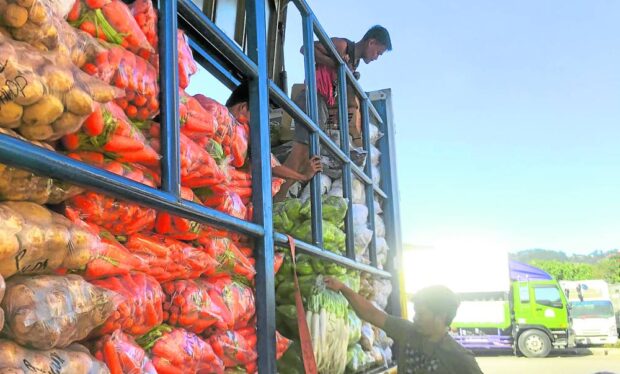
SUMMER STOCK Vegetable farmers and traders in Benguet spend their early hours each day trimming then packing lettuce, cabbage, beans, carrots, cauliflower, broccoli and other salad vegetables that end up in Metro Manila markets and groceries. Benguet province supplies 80 percent of Luzon’s highland produce. —VINCENT CABREZA
LA TRINIDAD, BENGUET—The Department of Agriculture (DA) last week inspected one of two vegetable trading posts in this province to determine why carrots, cauliflower, lettuce, cabbages and broccoli become “too expensive” when sold in Metro Manila.
Agriculture Assistant Secretary Rex Estoperez, chief of staff of the agency currently headed by President Marcos, said the government wants to understand how vegetable costs shot up in the supply chain when shipped from the producers to the Divisoria market in Manila City, where the bulk of vegetables grown in Benguet province would end up.
Benguet farms grow 80 percent of the salad vegetables sold each day in the National Capital Region and other Luzon markets.
“It is not reasonable when vegetables are priced at P30 a kilo here but are sold for P120 in Manila,” Estoperez said at a March 24 briefing after he completed his inspection of the Benguet Agri-Pinoy Trading Center (BAPTC) here.
The DA wanted to examine “the whole trading system and the whole marketing system” from the farms to BAPTC and the La Trinidad Vegetable Trading Post, and finally when produce has been transferred to major dealers in Luzon and the small-scale Manila retailers, Estoperez said.
Cold chain
On March 21, the Department of Science and Technology (DOST) and the Benguet provincial government unveiled an improved processing system at the Benguet Cold Chain building to eliminate wastage and increase the shelf life of Benguet crops.
Vegetable and fruit losses have risen as high as 52 percent due to spoilage during transit, said Science and Technology Undersecretary Leah Buendia at the launching ceremony.
Cordillera terrain proved to be a huge contributor to crop wastage, said Daisy Tañafranca, a retired DOST official who used to oversee the Packaging Technology Division. Vegetable truckers “pack every available space” with crops, she said, which bruise each time the vehicle ascends or descends 45-degree mountain slopes.
A slight abrasion on a strawberry, for instance, would develop into molds that infect other berries inside a truck, Tañafranca said.
Broccoli spoilage could go up to over 69 percent, she said, noting that proper packaging and handling could bring it down to about 32 percent.
Carrot spoilage has risen to 35 percent, but that would be reduced by 5 percent when the vegetable is secured inside plastic crates, Tañafranca said. INQ